The Partnership: How Nicole Kidman Convinced A Hesitant Lulu Wang To Take The Helm In Prime Video’s ‘Expats’
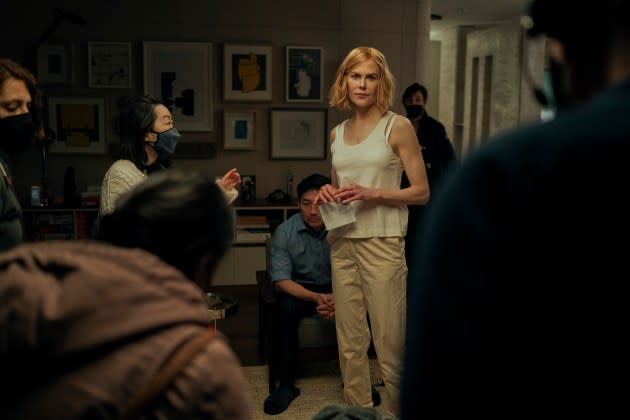
Lulu Wang remembers Nicole Kidman spiraling down a psychological rabbit hole in Jonathan Glazer’s 2004 dream-like masterpiece Birth where a woman believes that a 10-year-old boy is the reincarnation of her dead husband. “That’s my favorite,” Wang declares, much to Kidman’s delight — and surprise. During the making of Prime Video’s Expats drama series, based on Janice Y.K. Lee’s second novel, The Expatriates published in early 2016, they both discovered that they had the same ‘get up and do it’ sensibility. As Kidman put it: “You’ve got to roll up your sleeves and do it.” Followed by a cry of “Don’t just sit there, let’s do it, let’s do it.” Wang says it’s “super rare” to meet someone like Kidman. “It feels pretty rare because there are a lot of people who talk about meeting more female directors. But I think that the evidence is in the resume. You can talk about it all you want and shout about it, particularly if you are somebody who has a particular status in Hollywood where your name green lights projects, and you are not using your name to green light projects with women at the helm. If you’re not doing it, then who’s going to do it?
Then who are you talking to? You are the industry. So that was great. And there’s a lot of actors now who are producers, and that’s where the power lies, not to just have the power to help yourself, but to really create a project, an ecosystem for other people to come into it.”
More from Deadline
Initially, the filmmaker turned Kidman down, but the actor was able to soothe Wang’s fears — before, during and in postproduction.
“Throughout the edit, Nicole would ask me how I was feeling — if the show was good, if I was happy with it… and I would never say yes. She always sensed hesitation in my voice. I don’t know if that scared her, that I couldn’t reassure her. It wasn’t that I wasn’t proud of what we were doing, but it’s the same cautiousness I approached the project with, I think. I always keep a level of questioning to stay focused on the process, to make sure I can actually make something the best it can be and to keep my eye on continuing to make it better. I think Nicole understands that better than anyone.”
Both are eager to work together again. Wang revealed that she’s writing a movie for Kidman, though she’d been keeping it a secret from the actor until now. The superstar was moved when Wang informed her about the screenplay. “I’ll go to that,” Kidman responded. “I’ll walk through fire” to work with her again.
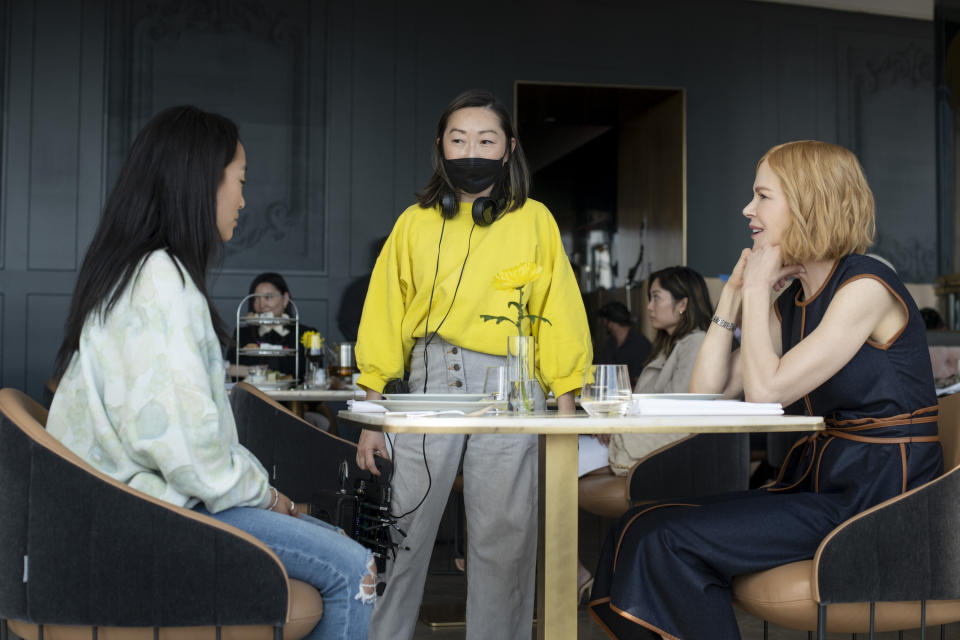
DEADLINE: So, Nic, did you read Janice Y.K. Lee’s novel The Expatriates in galley form or when it was published?
NICOLE KIDMAN: Well, my sister [Antonia] read it. My sister was in Singapore, living there. And my sister read the novel and said, “I think this would make a great film.” And so I called Janice and optioned it. We called her book agent, and that was the beginning of it. My sister’s got really good taste. I always say, you never know where the stories are to find them. And the book had been out for a while, actually.
DEADLINE: So, at that time the book had aleady been out for, what, a couple of years maybe?
KIDMAN: I think it had, yeah, a couple of years. But it was a must-read among many of the expats. It was sort of the book. And I traveled and lived with her in Singapore, and obviously had been to Hong Kong. And I was just like, “This is a whole world that isn’t explored. And there’s so many different stories here that you can explore.” And we did not know how long it was going to take to get it made, but it had its own paths to creation.
DEADLINE: This probably was what, 2018? So, when was The Farewell first shown, Lulu?
LULU WANG: Sundance 2019. And I think July 2019 is when the film came out in theaters.
KIDMAN: I saw it at the Belcourt in Nashville, which is the little art cinema there, and it was packed. Literally. You couldn’t get in, just couldn’t. I finally got a seat and saw it and just said, “Oh my god.” And that was it. Then I asked, “OK, what happens next?!”
DEADLINE: Did you immediately think after seeing The Farewell, “OK, I’ve just found our director?”
KIDMAN: Yeah, yeah. But that’s very daunting because then you go, “Well, now I’m not giving any other options for it to be made.” But at the same time, things are either meant to be made or they’re not, and the right people take the helm or they don’t, and that’s that. And I don’t think it’s just, “Oh my god, we’ve got the book and, we’ve optioned it, and we’ve paid money. We have to, no matter what, make it, even if it’s compromised.” It was, “No, there’s only a particular way to make this.” And that’s why I said, “If you want it, it’s yours, and I’ll support the vision.”
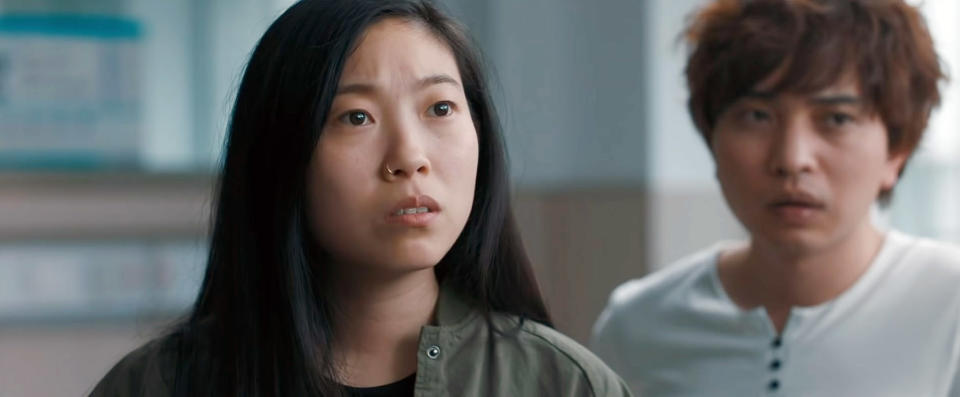
DEADLINE: Let’s just rewind a little. I understand Lulu, that initially, you were hesitant about doing it, is that correct?
WANG: Well, I said “I’m going to pass on the project, but I can’t just write Nicole Kidman in an email. So I said, let’s set up a phone call and I’m going to tell her that I love the book, I love her, so I can hopefully work again with her in the future, but I can’t do this project.” So that was over the phone. And I believe that that’s when she was like, “OK, OK, but let’s have dinner.”
And then I talked to Barry [her partner Barry Jenkins] and Barry said, “Go to dinner. Yeah, Nicole invites you to dinner. Go to dinner.” So I was like, “But I already said no, all right, I’ll go to dinner.” So, I went to dinner just to maintain the relationship hopefully for the future. And then we had a few drinks and she said, “Why is it that you’re saying no?” And I told her all, she said, “Well, if you could have it any way you wanted, what would you want and what would you need?” And I said, “No, you guys have been developing it for so long, but I would really need to build this from the ground up. I would need to fill the room with people who I think are right perspective wise for this project that have different perspectives than me, including the novelist. I love some of the characters in the book, I could really see them having their own episodes.”
I had ideas, but I just felt like there’s no way. And she’s just like, “Oh, OK, OK.” And then she texted or called, I can’t remember, another or 24, 48 hours later, she said, “OK, so we talked to Amazon and you got it.”
KIDMAN: I think I was in Toronto, and I met your agent, and he said, “Well, she’s going to need this and this and this.” And I’m like, “Yep, yep, yep. Yeah.” It wasn’t like needing accoutrements. It was for the shoot and things that she needed to control and bring her DoP, bring all the things she needed that would make her feel safe, and also to realize it. Then Lulu and I had our drinks and she told me what she needed to feel safe and to realize her vision.
DEADLINE: From previous conversations, Lulu, your intent wasn’t to just follow what was in the novel, you wanted to really adapt it.
WANG: It was that, and also just making sure that we could actually stay true to the novel. Because so often when you do a TV or film adaptation, the powers that be might want it to be more plot driven. They’re like, “We love this, but make it more this other thing.” What I loved about the novel is how nuanced and character-driven it was, and that it wasn’t plot- driven and that there are no easy answers. And that’s what I wanted to make sure we could preserve in the adaptation.
DEADLINE: And Nicole, there was no problem from you with that sensibility? You just said, “Go ahead?”
KIDMAN: That doesn’t seem crazy to me. That’s like, the talent needs to be supported, I think. Everyone seems like, “That’s such a bold movement.” I said, “No, I don’t know any other way to do it,” but I have a strong sense of commitment to the craft, to filmmakers, to writers, and…
WANG: To risk taking, creative risk taking.
KIDMAN: It doesn’t seem crazy why I’m like, “But yeah, of course.” It is odd. I don’t know why…
WANG: But it is, it’s like a web, right? Because by supporting me, then I could then take that power and support the filmmakers around me, my DoP, my production designer, and then they support the people they work with on their teams. Then they fight to bring on the Steadicam operator that they believe in, and it trickles down. And that’s what is so incredible. Nicole, being able to support me, created this entire network and world of filmmakers, women, people of color who’ve never had the opportunity to be in this space.
KIDMAN: And we talk about doing it, but you got to do it. We can all sit around at the dinner table and talk about it or do interviews and talk about doing it. But I’m always reluctant to do too much talking about it because it’s better to just get in there and do it.
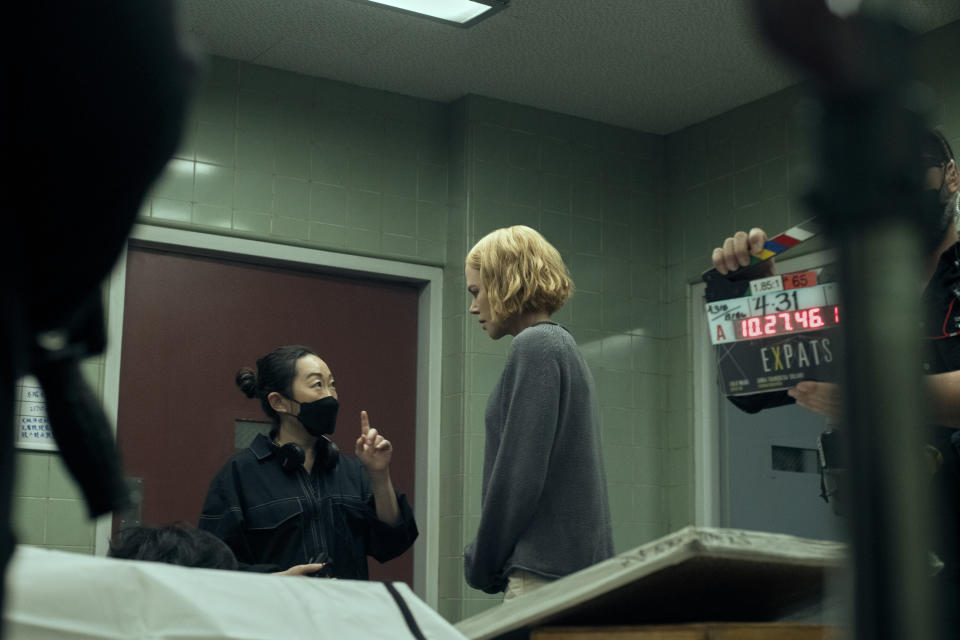
DEADLINE: Absolutely. I remember many, many, many years ago at Cannes there was almost like a Kidman manifesto, and you said something to the effect of, “I want to make a movie or a TV show or a stage show with a woman, with a female contingent.”
KIDMAN: It was at a press conference in Cannes where I said, “From now on every 18 months, I will work with a female director.” And then I went, “18? That’s too long,” in my head. So, the declaration was 18 months, but I knew in my head it would be every six months to a year.
DEADLINE: And you’ve been true to realizing that.
KIDMAN: Realizing it is just you’ve got to roll up your sleeves and do it. And that requires not being precious and just going, “OK, let’s go, let’s go, let’s go.” And being consistent and determined to do it. And then the other side of making the statement is make it publicly, hold yourself accountable and get it done.
The actual kind of giving, and that’s where I say to my family and my daughters and the people that go, “OK, you sure you can do this?” I’m like, “Yeah, if you support it.” And they’re like, “Yeah, yes, go for it.” And hopefully they’ll carry that forward too. I grew up with a mother and a father who said, “Well, just do it then. Don’t sit around and talk about it. Let’s go.”
WANG: Her mom is the best. I haven’t met her, but all the stories, I feel like I’ve been with her, we’ve got similar mothers who are very honest with us and hold us accountable and push us to be better.
KIDMAN: And not sugar-coat things.
WANG: Exactly.
KIDMAN: Never.
DEADLINE: But for you, Lulu, when you’ve read these pieces about Nic and she told you what she wanted to give you, what was your view? Did you think, “OK, is this legit?” Because, as you just said, you didn’t really want to do it initially, did you?
WANG: It took me a while. Nicole knows me now, too. I am somebody who dives in feet first, and I’ve been told by my mother that I am a dilettante, and I will never be the master of anything if I am such a dilettante. My personality is like Nicole’s, in that I will just jump in. I say, I want chickens, and within a week I’m building the chicken coop. That’s just the kind of person that I am. But in Hollywood with this career that took me so long, I think I feel such a tremendous amount of pressure, not just to myself and my career, but to the whole community. I can’t mess up in a way, and I’m trying to let that go. That’s a whole another story, because if I mess up, then other people might not get these opportunities in the future.
I do have to pause, and I have to be harder on myself and the conditions under which I can actually realize the thing. And there is, as you said, a lot of BS in the industry that you have to filter. And Nicole and I talked early on, and I said, “Well, are you a movie star? Are you an actor? How do you show up?” And she was like, “Oh my god.” She was offended I asked that. But I said, “Well, this is how I shoot. This is my work ethic.” And she said, “Me too. Let’s do it.”
I mean, the first day on set, she showed up. We talked for hours with the crew and intimacy coordinator about blocking the windows and how to make Nicole feel comfortable and safe. And it’s a seventh-floor apartment building in a totally…
KIDMAN: It was amazing.
WANG: And we wanted to make sure Nicole was comfortable and all of that. And we were like, “Should we block the windows? But we don’t want to block the window. We want to see outside. But she’s naked in a bathtub, OK maybe.” And she walks in, she said, “Hi.” And she just took her clothes off and I thought, “Oh. Oh. OK. I guess.”
KIDMAN: But I could see the room. I could see what it was. We needed to shoot it. We had to get the light, and now let’s loosen up. Because part of it is just going, “Let’s take all of the onus of all of this and let’s just start.” And some of it’s going to work. Some of it’s not. Just start going, let’s go. Let’s go, pick up the camera. And that’s where Anna [Franquesa-Solano], the DoP, she was operating on me within an hour and we’re like, “Just try this.” And that for me is fun. And then I feel at home, but if there’s too much protection, I don’t like that, and it makes me very nervous, I don’t think it’s the best place to come and try and create from. Then it’s like, “Oh, no, what are you expecting?” I’ve got to be able to be really bad to become good.
Does that make sense? Everyone has to. You can’t be going, “Well, this has to be perfect,” because you don’t know where it’s going to come from and when it’s going to happen, and you’ve got to capture it.
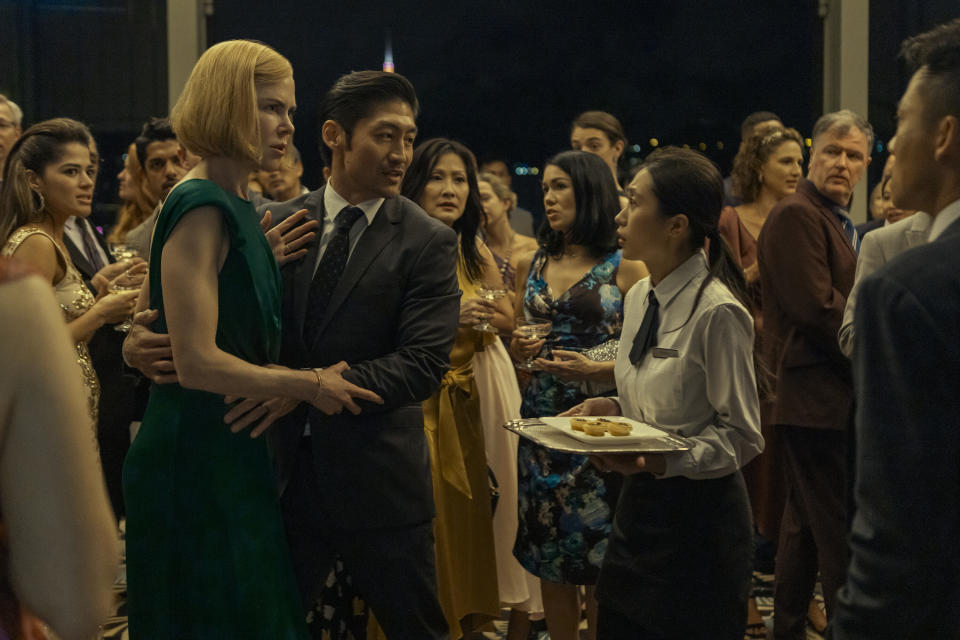
DEADLINE: Absolutely.
KIDMAN: And just be ready to let go.
DEADLINE: What Nic’s just said is fascinating to me. And I think it’s partly to do with her Australian upbringing. There is no nonsense. Just get it done.
KIDMAN: It’s pragmatism.
DEADLINE: So, Lulu, what was your reaction after that first day in that building?
WANG: Well, I mean, it said to me that we were doing it. We were going to roll up our sleeves. Every step of this process was, there was just always this surreal moment of, from the first email to the first phone call, to the first time we had dinner. And I was always like, “OK, this is too good to be true. I’m going to ask for these things. And at some point, the floor is going to collapse.” And it’s not because so many people talk about things and then it doesn’t get done. We wrote the scripts, Nicole’s like, “I love them. Let’s go make it.” And that is so rare to find, that kind of esprit of, even though it took a long time, because the world was going through a lot of different challenges, none of the pause or the hesitation was from the team or from the studio.
We wrote the script in three months, and they were like, “Let’s go.” And I was saying, “I’m not shooting it.” And they said, “Well, we were thinking maybe Malaysia, maybe we could build sets.” And I said, “I’m not shooting this anywhere but Hong Kong, I can’t make this show if it’s not set in Hong Kong.” And so they said, “Well, I guess we have to pivot.” So off we went, location scouting. Oh, but it’s the middle of the pandemic. OK, well let’s apply for our permits.
There was a business Visa, so we did that. There’s a 21-day quarantine. I don’t care. Let’s do it. Everybody was just moving trains. And I think that’s headed by Nicole.
KIDMAN: A typhoon came.
DEADLINE: A typhoon?
KIDMAN: That’s actually not abnormal in [that part of the world].
WANG: We had three typhoons while we were there. Then we had to build that night market over and over again. Have a typhoon coming, have to shut down, even though we’ve built out the whole night market, all kinds of stuff.
KIDMAN: But it’s fantastic that it made it onto the screen and that it’s there in existence and it’s very, very rich and nuanced and deep.
DEADLINE: Lulu, Nic is your leading actor in this piece. How would you consult with her as an executive producer on the set? How did that work?
WANG: Nicole was very clear that when she showed up on set, she was the actor, and it was a way for her to be Margaret rather than executive producer. I think that it just was very separate, and I sort of grew to know that. I didn’t know it initially, but then as we got to know each other, Nicole needed to be able to, because as a producer, you have a lot of power and you’re having to oversee the whole picture. And as an actor even, I would say, “Well, the context for this scene…” And she’s like, “No, no, I don’t need the context, what does Margaret know? I only need to know what Margaret knows, what Margaret feels, because that’s what’s real for the character. If I see too many things, then I’m not in her.”
KIDMAN: And the power cannot be where… I remember saying to Lulu, “You are the leader I have to follow in step with you, because otherwise the dynamic’s going to be stretched. You’ve got to let me come in and go, ‘OK.’” There was a whole team of people that could support her in that area. And when I needed to — if she said, “No, no, now you got to get on the phone and we’ve got to get this” — then I would. But my inclination is always, “Let me come in as your actor and you take the reins and I’ll follow.”
DEADLINE: Nic, I’ve heard you say that it was so important to do this because a series led by women was so important, how involved were you in the casting of people that you knew you were going to be together with for a year or so?
KIDMAN: I was involved with that. Lulu and I would talk because a lot of it is very good. Yeah, I can see that. And then that was us together going, “What do you think? What do you feel?”
WANG: And it was great, because we were doing it at that point through Zooms, we’re getting a lot of audition tapes and Zoom videos that were recorded. We would be able to review together and talk about it.
KIDMAN: And I love actors. And then I can go, “Oh, OK, yeah, I see what that is.” But Lulu had strong ideas on what needed to be physically there, what needed to be emotionally there. And she would sort of steer and say, “Well, this is what I need.” And I’m like, “Yeah, then OK, we need to maybe see that again. Let her have another go and see.” And it was finding the right people for the role. Not a name, not that, but who is going to service the story and give the best performance in the ensemble.
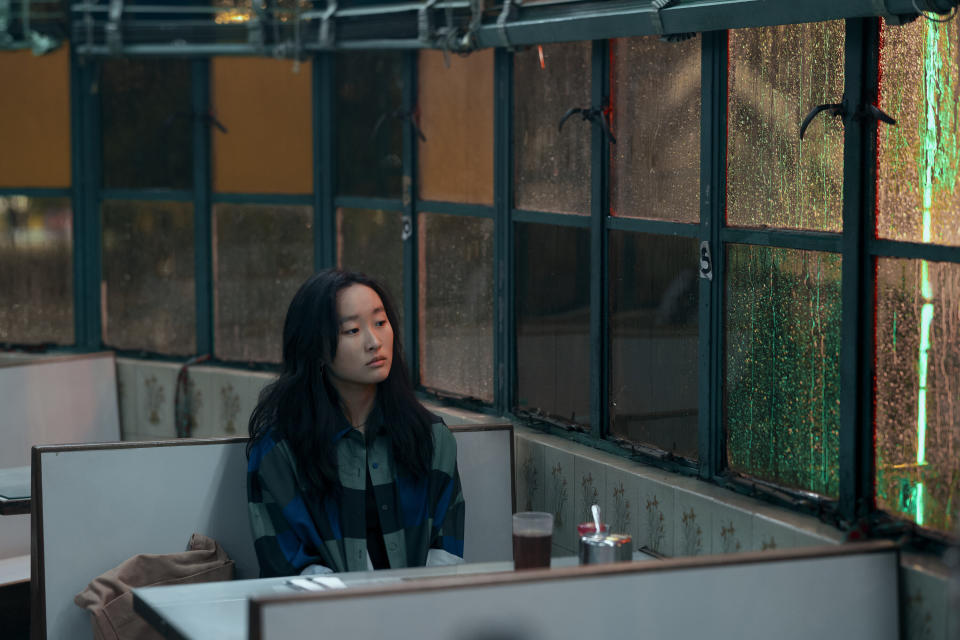
DEADLINE: So, to find the actress who plays Mercy, Ji-young Yoo, and Sarayu Blue’s Hilary, they’re brilliant. How involved were you in their casting?
KIDMAN: That’s having to rigorously look and then go to Amazon and go, “Listen, these are the best people.” And then I have to say, “OK, let’s go.” And Lulu had to go, “This is what we need to support it, please.” And they did, which we’re very grateful for.
DEADLINE: There were no Amazon execs saying, “You need stars” or whatever?
KIDMAN: No, and that’s really admirable because you’re talking a lot of money, and we get it. It has to be called out and acknowledged because this was actually an incredible leap of faith for them.
WANG: And we would have conversations. It’s not like they went, “It’d be great if we had a little bit more of a star. What about this?” I would say, “Well, this is why this is important to the story and the identity of this particular actor has to be this.” And they’d be like, “OK, we get it.” And so that was just wonderful to be able to have that back and forth and be respected.
DEADLINE: And what’s so great, Nic and Lulu, is that your cast is so diverse. They’re South Asian. They’re not all Caucasian. Sometimes you see this sort of casting just for the sake of it. This is legitimate.
KIDMAN: Yes, absolutely. And it’s why they’re so good, and it’s why it’s an ensemble that’s working together. It was all really, I mean, she placed it all knowing. I mean, look at Ruby [Ruiz]. Oh, extraordinary. Yeah!
DEADLINE: You’re about to go and catch a plane, so what are you up to now, Nic?
KIDMAN: I’m going back to finish Nine Perfect Strangers 2 in Germany and Austria. It’s so beautiful there in the Austrian Alps right now.
DEADLINE: And what about Big Little Lies? Is the third season happening?
KIDMAN: Next year. Next year.
DEADLINE:
OK. And are you two going to work together again?
KIDMAN: [Vigorously nodding] I hope so. I’d walk across hot coals to work with her again.
WANG: I’m writing a movie for Nicole, she doesn’t know.
KIDMAN: She better. I’ll go to that. I’ll walk through fire.
DEADLINE: I’m going to ask my annual question about the stage quickly before you get on that plane.
KIDMAN: Yeah. Well, I just saw Sarah Snook [in The Picture of Dorian Gray] and I was floored. So now I’m way too terrified. Sarah was so amazing. Come on. But I also saw Hills of California [by Jez Butterworth and directed by Sam Mendes], which I loved. And then I go, “Oh, got to go. I got to go and do it.” But as I say, “Please don’t let it be 17 years before I get on the stage again.” Photograph 51 was the last time. What was that, in London seven years ago?
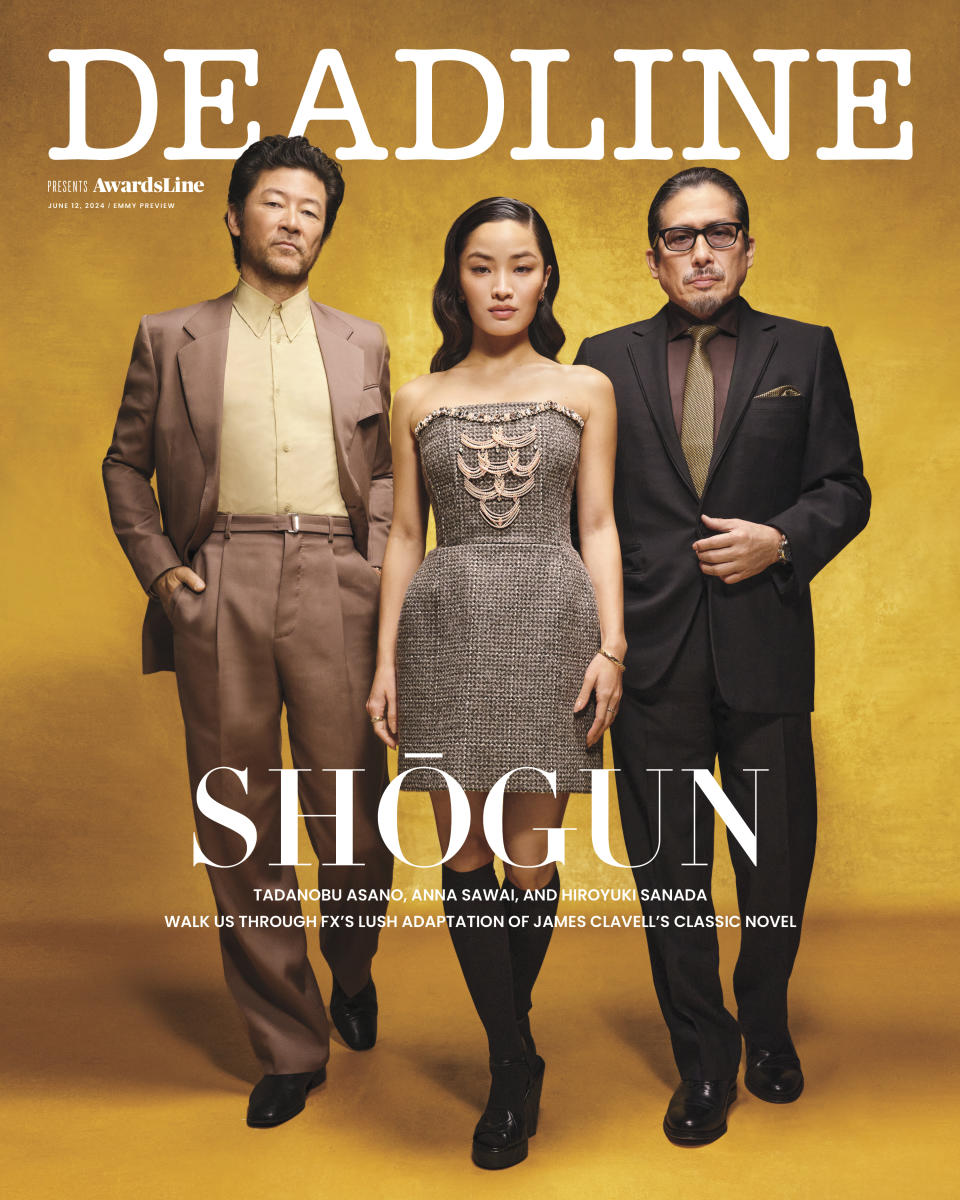
DEADLINE: A little stage deviation there, Lulu. But how unusual was that set-up, to work with Nicole the thespian who left the executive producer responsibilities at the door?
WANG: I mean, it is slightly terrifying because the roles are so different in terms of power. She’s, as an executive producer, hiring me to direct. She is my boss, but then on set, not that there’s a hierarchy, but I can’t be scared to direct my actor. And even if my actor doesn’t agree with me, I need to be able to say, “Hey, this is my movie. I was hired to do this. You gotta do this.” But if the person that you’re giving that direction to is also the person who hired you, you might be scared to be assertive. And so that’s where I got a little bit nervous. But with Nicole, she had such a clear separation of, “I’m an actor now, I’m in your hands. You tell me what you need me to do.” And then when we weren’t on set as a producer, it was much more like, “OK, what’s happening? How do I help? Who do I call?” It was initially scary, but I think that she balances it really well.
My mom, again, would say things like, “Why are they trusting you?” Because even when my dad saw The Farewell, he was like, “Yeah, it’s emotional, but why do people find this interesting? It’s just real life.” And so, to them, it’s like, “You made a movie about our family that was just real life. And now this huge movie star in a huge studio is giving you the keys to this castle, why?” And so, I think that whenever something like that happens to me, not that I’ve necessarily questioned it, but I feel the responsibility to live up to, and exceed, their expectations and their trust.
Best of Deadline
'House of the Dragon' Season 2 Release Schedule: When Do New Episodes Air?
'The Boys' Season 4 Release Schedule: When Do New Episodes Air?
Sign up for Deadline's Newsletter. For the latest news, follow us on Facebook, Twitter, and Instagram.


